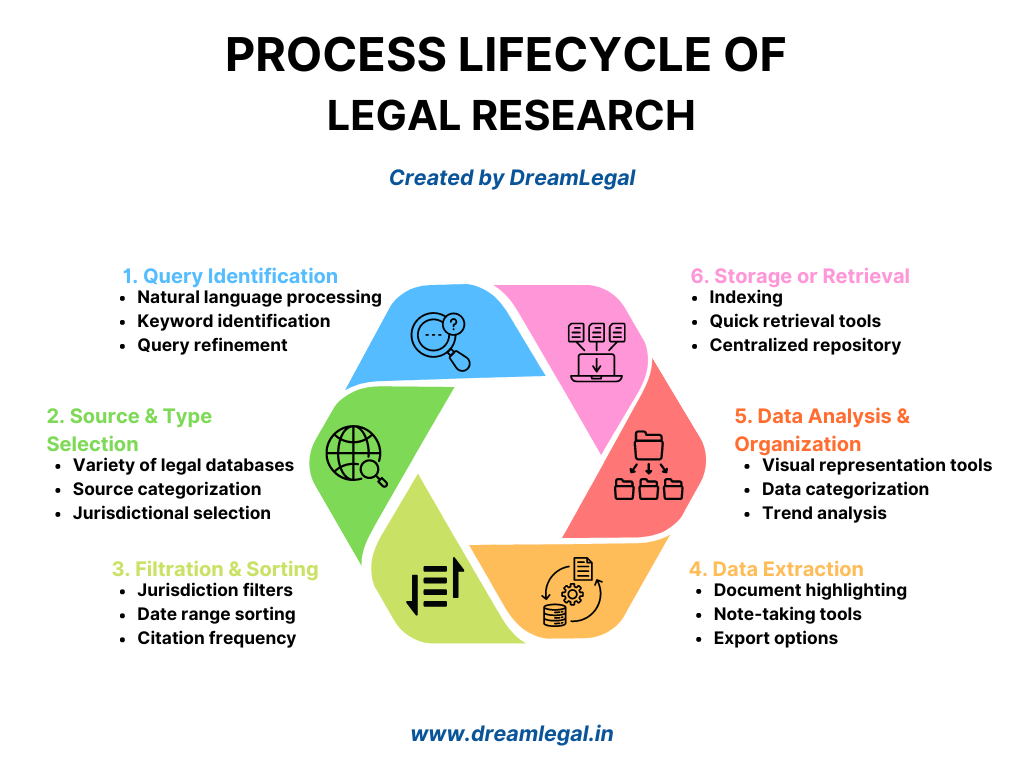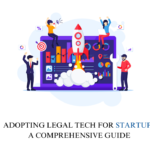Introduction
Legal research is a cornerstone of effective legal practice. With the growing complexity of legal issues and the vast amount of information available, robust Legal Research tools have become indispensable for lawyers. These tools streamline the research process, providing access to critical legal resources and advanced search capabilities. This guide explores the key aspects of Legal Research tools, focusing on the research process lifecycle, core functionalities, and how to evaluate these tools based on specific legal practice needs.
Understanding the Legal Research Process Lifecycle
A comprehensive Legal Research tool should effectively manage the entire research process lifecycle, from identifying the query to organizing and storing the extracted data. Understanding these stages is essential for selecting a tool that aligns with your research needs.

The Legal Research Process Lifecycle
Query Identification
- Key Features: Natural language processing, keyword identification, query refinement.
- For Law Firms: Enables lawyers to accurately define research queries, ensuring relevant results that address client needs.
- For In-House Legal Teams: Helps identify precise research queries that align with the company’s legal concerns.
- For Individual Practitioners: Simplifies the process of formulating research questions, making it easier to get relevant results.
- For Enterprises: Supports large-scale legal teams in defining queries that impact various departments.
- For Startups: Assists small firms in identifying key legal questions, streamlining their research efforts.
- For Government Departments: Aids public sector legal teams in crafting precise queries related to regulatory and legislative issues.
- For Judiciary: Supports judicial officers in formulating queries for legal precedents and case law.
Source and Type Selection
- Key Features: Access to a variety of legal databases, source categorization, jurisdictional selection.
- For Law Firms: Ensures access to comprehensive legal sources, including case law, statutes, and secondary materials.
- For In-House Legal Teams: Helps in selecting sources that align with corporate legal requirements across jurisdictions.
- For Individual Practitioners: Provides access to diverse legal sources, enabling thorough research across various topics.
- For Enterprises: Supports the selection of sources that meet the complex legal needs of a large organization.
- For Startups: Offers access to essential legal sources, helping small firms build strong cases with limited resources.
- For Government Departments: Ensures access to legislative and regulatory databases critical for public sector legal work.
- For Judiciary: Provides judges and clerks with access to a wide range of legal sources necessary for informed decision-making.
Filtration and Sorting
- Key Features: Jurisdiction filters, date range sorting, citation frequency.
- For Law Firms: Helps lawyers filter and sort results to quickly find the most relevant legal precedents and statutes.
- For In-House Legal Teams: Enables filtering by jurisdiction and relevance, ensuring that research aligns with corporate legal strategy.
- For Individual Practitioners: Simplifies sorting and filtering, helping solo lawyers efficiently manage research results.
- For Enterprises: Assists large legal teams in sorting vast amounts of research data, focusing on relevant jurisdictions and timeframes.
- For Startups: Provides easy-to-use filtering tools that help small firms prioritize relevant legal information.
- For Government Departments: Ensures public sector legal teams can filter research results by government-specific needs.
- For Judiciary: Supports the sorting of legal information by court level, jurisdiction, and relevance to current cases.
Data Extraction
- Key Features: Document highlighting, note-taking tools, export options.
- For Law Firms: Facilitates the extraction of key legal information for use in case preparation and client advisories.
- For In-House Legal Teams: Allows legal teams to extract and compile relevant data for internal reports and compliance documentation.
- For Individual Practitioners: Helps solo lawyers extract pertinent information from research results for use in legal briefs and arguments.
- For Enterprises: Supports the extraction of legal data across multiple departments, ensuring consistency in legal documentation.
- For Startups: Provides tools for extracting and organizing legal information, aiding in efficient case preparation.
- For Government Departments: Assists in extracting legal data necessary for public sector reports and legislative reviews.
- For Judiciary: Facilitates the extraction of case law and statutes relevant to judicial rulings and opinions.
Data Analysis and Organization
- Key Features: Data categorization, trend analysis, visual representation tools.
- For Law Firms: Supports the analysis of legal trends and the organization of research data into actionable insights.
- For In-House Legal Teams: Helps in analyzing compliance data and organizing research findings according to business needs.
- For Individual Practitioners: Simplifies the analysis and organization of legal data, making it easier to build strong cases.
- For Enterprises: Assists large legal teams in organizing vast amounts of data and identifying legal trends relevant to the organization.
- For Startups: Provides tools for analyzing and organizing legal information, supporting informed decision-making.
- For Government Departments: Helps public sector legal teams analyze legislative trends and organize research for policy development.
- For Judiciary: Supports the analysis and organization of legal precedents, aiding in the drafting of judicial opinions.
Storage or Retrieval
- Key Features: Centralized repository, indexing, quick retrieval tools.
- For Law Firms: Ensures that all research data is stored securely and can be easily retrieved for future cases.
- For In-House Legal Teams: Facilitates the storage and retrieval of legal research, ensuring compliance and easy access to information.
- For Individual Practitioners: Simplifies the storage of research data, ensuring it is easily accessible for future reference.
- For Enterprises: Supports the secure storage and retrieval of legal research data across multiple departments.
- For Startups: Provides scalable storage solutions that grow with the firm’s research needs.
- For Government Departments: Ensures that public sector research data is stored securely and can be retrieved for legislative and policy work.
- For Judiciary: Supports the storage and retrieval of legal precedents and case law for judicial reference.

Evaluating Based on Practice Needs
When selecting a Legal Research tool, it’s important to consider the specific needs of your practice. Below are tailored recommendations for different types of legal professionals:
Law Firms
- Focus: Comprehensive case law research, statutory research, and advanced search capabilities.
- Why: Law firms need access to extensive legal databases and advanced search tools to efficiently handle diverse and complex legal matters.
- Key Features: Case law databases, statutory databases, AI-powered search.
In-House Legal Teams
- Focus: Integration with corporate systems, legislative tracking, and statutory research.
- Why: In-house teams require tools that align with corporate strategies and ensure compliance across jurisdictions.
- Key Features: Statutory research, legislative updates, system integration.
Startups and Small Firms
- Focus: Cost-effective, scalable research tools with robust search capabilities.
- Why: Startups need research tools that offer comprehensive legal resources while being budget-friendly and scalable.
- Key Features: Scalable search functionality, case law databases, budget-friendly pricing.
Government Departments
- Focus: Compliance with laws, access to legislative databases, and secure storage.
- Why: Government entities need tools that provide access to up-to-date legislative information and ensure compliance with public sector regulations.
- Key Features: Legislative tracking, compliance applicability, secure data storage.
Individual Practitioners
- Focus: User-friendly interfaces, access to secondary sources, and comprehensive search tools.
- Why: Solo practitioners need straightforward tools that allow for in-depth research without overwhelming complexity.
- Key Features: Legal treatises, Boolean search, document indexing.
Enterprises
- Focus: Customization, integration with enterprise systems, and access to international legal resources.
- Why: Large corporations require tools that support global operations and provide detailed insights across multiple jurisdictions.
- Key Features: Customizable workflows, international treaties, advanced legal analytics.
Judiciary
- Focus: Secure document handling, citation validation, and comprehensive case law research.
- Why: Judicial bodies need tools that ensure legal research is thorough, accurate, and adheres to procedural standards.
- Key Features: Citation validation, historical case law archives, secure data storage.
Core Functions of Legal Research Tools
Selecting the right Legal Research tool involves understanding how well it supports each stage of the research lifecycle while offering essential functionalities. Here are the core functions that legal professionals should focus on:
Case Law Research
- Beneficial For: Law Firms, Judiciary, In-House Legal Teams, Government Departments.
- Why: Access to comprehensive case law databases and jurisdictional filters is essential for finding relevant precedents and validating citations.
- Key Features: Comprehensive case law databases, jurisdictional filters, citation search and validation, historical case law archives.
Statutory Research
- Beneficial For: Law Firms, Enterprises, In-House Legal Teams, Startups.
- Why: Statutory research tools provide access to current laws, regulations, and legislative updates, which are crucial for compliance and legal advice.
- Key Features: Statutes and regulations databases, annotations and historical versions, legislative tracking and updates.
Secondary Sources
- Beneficial For: Law Firms, Government Departments, Individual Practitioners, Judiciary.
- Why: Access to legal treatises, journals, and international conventions is vital for in-depth legal research and understanding complex issues.
- Key Features: Legal treatises and commentaries, journals and law reviews, international treaties and conventions.
Advanced Search Capabilities
- Beneficial For: Law Firms, In-House Legal Teams, Enterprises, Startups.
- Why: Advanced search capabilities ensure that legal professionals can conduct efficient and thorough research, even across large datasets.
- Key Features: Boolean and logical search, AI-powered search and chat, document upload.
Filter and Sorting
- Beneficial For: Law Firms, Judiciary, Government Departments, Startups.
- Why: Filtering and sorting tools allow legal professionals to quickly narrow down large volumes of information to the most relevant data.
- Key Features: Jurisdiction and court level filters, date range and publication type sorting, relevance and citation frequency filters.
Final Thoughts
Choosing the right Legal Research tool requires careful consideration of how well it supports each stage of the research lifecycle and the specific needs of your legal practice. By focusing on core functions like case law research, statutory research, and advanced search capabilities, you can select a tool that enhances your research efficiency, ensures compliance, and supports informed legal decision-making, leading to more effective and successful legal outcomes.
CHECK OUT LEGAL RESEARCH TOOL ON DIRECTORY OR CLICK HERE


